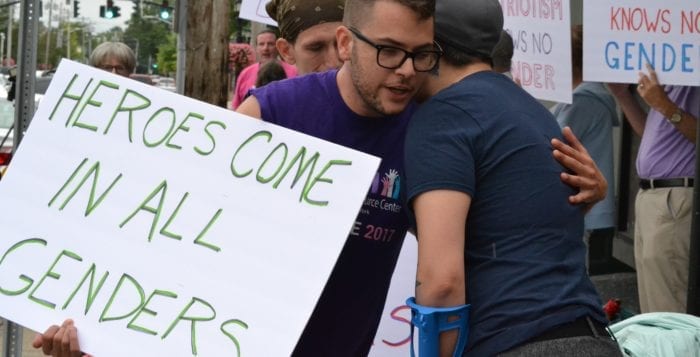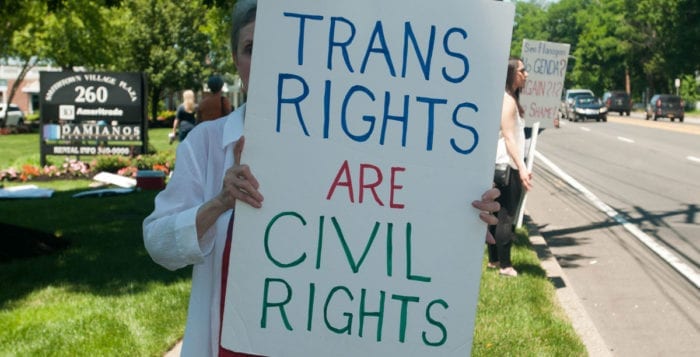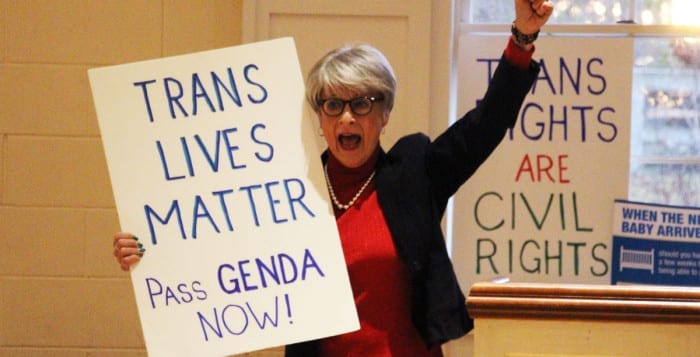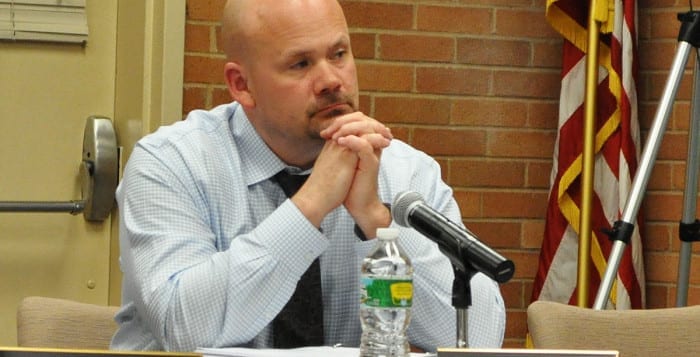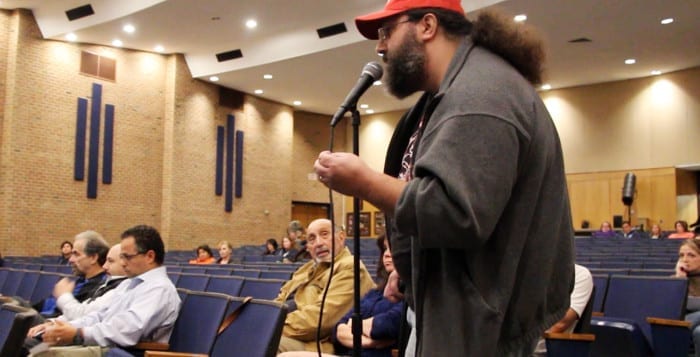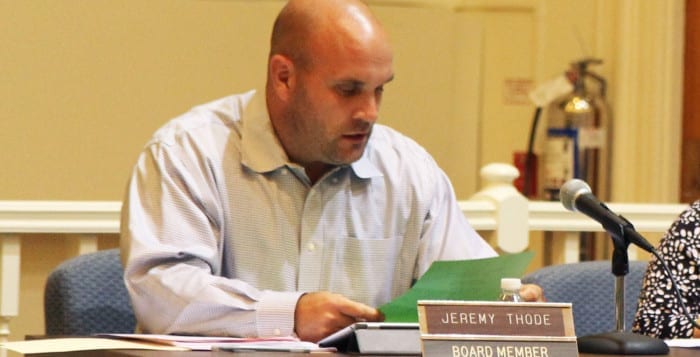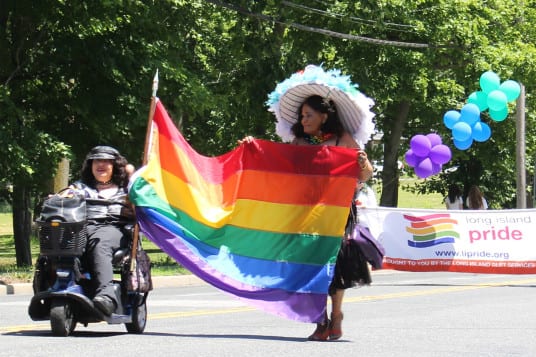By Jill Webb
In a show of unity, North Shore residents resoundingly condemned President Donald Trump’s (R) intentions to ban transgender people from the military this past week.
Individuals gathered in front of the U.S. Army Recruitment Center in Smithtown in disapproval of President Trump’s announced ban July 27.
The ban stemmed from a series of tweets President Trump put out July 26, citing his reasoning for the transgender ban being that the military “cannot be burdened with the tremendous medical costs and disruption that transgender in the military would entail.”
Trump’s declaration of the ban on Twitter led the Long Island Transgender Advocacy Coalition to come out to Smithtown to oppose the ban in a peaceful demonstration. The group advertised the demonstration via Facebook as a way for the transgender community and their allies to speak up for transgender service members.
Juli Grey-Owens, executive director of LITAC led the demonstration with a loudspeaker in hand, chanting in solidarity with the transgender community.
The goal of the demonstration, according to Grey-Owens, was to put transgender soldiers in the spotlight.
“To make people aware of the fact that there are Americans that are supporting our transgender troops — that’s important,” she said. “Number two, it’s to make people aware of the fact that the transgender community is constantly under duress, constantly being discriminated against and this is just one more thing.”
The aim of LITAC is to advocate for the transgender community, often through forums, demonstrations, and putting on informational sessions that Grey-Owens refers to as transgender 101s.
The Sexual Orientation Non-Discrimination Act, passed in 2003 makes it unlawful for anyone in New York State to be discriminated against in employment, housing, credit, education and public accommodations because of their actual or perceived sexual orientation.

But the law isn’t as clear for transgender individuals. SONDA does not explicitly prohibit discrimination based on gender identity and expression — but it does apply when a transgender person is discriminated against based upon his or her actual or perceived sexual orientation, according to the New York State Attorney General’s office.
Specific counties and areas, including Nassau and Suffolk County have taken matters into their own hands and passed more specific anti-discrimination legislation for sexual orientation.
Grey-Owens said that LITAC’s objective is to step in at any time the transgender community is being discriminated against.
The executive director, along with many of the other attendees of the demonstration, was aggravated with Trump’s accusations against the expenses of transgender health.
“One of things that they found is the number is so small in comparison to the defense budget, that it is a point zero something of the actual cost,” Grey-Owens said. “The army spends more on Viagra — ten times more on Viagra — then they will on transgender health costs.”
One of the best ways to help the transgender community, according to Grey-Owens, is to unite with them.
“If you take look at the crowd that’s here now, there are way more cisgender people [someone who’s gender identity matches the sex they were assigned to at birth] than transgender people here, and that’s made our voice louder,” she said. “People are adopting our cause as their cause. If they’re interested in helping out, this is how you help us: expand our voice.”
One participant, Edna White, said that she was in attendance in support of her transgender family and friends. She stressed the negative effects of the segregation.
“Taking a serious defense of our country — that shouldn’t be separated,” she said. “We’re already separated enough in war as it is, so to do that is really disheartening for me.”
Heather Sacc, another protestor said she found Trump’s sudden tweets against the transgender community very alarming.
“There’s 6,000 trans people in the military that have risked their lives,” she said. “The military didn’t ask for this. It’s just [Trump] woke up in the middle of the night and decided ‘oh that’s what I’m gonna do.”

Jay Gurecio attended the demonstration representing the LGBTQ+ visibility coalition, a group she is a co-founder of. Gurecio said she felt betrayed by Trump going back on his claims he would support the LGBTQ+ community during his campaign.
Trump tweeted in June 2016, thanking the LGBT community.
“I will fight for you while Hillary brings in more people that will threaten your freedoms and beliefs,” he said.
Guercio believes he has not kept to his promise.
“For him to go back on something that was implemented a year ago, that trans-people were allowed to serve and were allowed to get their surgery and their hormones covered, it’s just outright wrong,” Gurecio said.
Gurecio thinks the message Long Island should take from the demonstration is there is an LGBT community that will do everything in their power to stand in solidarity with each other.
“We’re peaceful, this isn’t angry, this isn’t something that’s even violent in any which manner,” Gurecio said. “I want people to understand that we just want to live our lives, and that we want the same rights as everyone else.”
The following day protestors continued to berate Trump during a visit he made in Brentwood to the Suffolk County Police Department.
Patricia Rios was holding a sign saying she voted for Trump and regretted her decision.
“Once he comes for the ‘T’ [talking about Transgendered] he’s going to come for the L, the G and the B,” she said. “So we’re here to protest that.”
Dr. David Kilmnick, CEO of LGBT Network, a Long Island LGBT advocacy group said more than just transgender military members rights were ignored this week.
“We found out… Trump was coming here, and timing would have it that he tweeted that he was going to ban transgender folks from serving our country and serving our military,” he said. “That wasn’t the only thing he did to the community this week — which was big enough. His attorney general filed a court brief saying that Title VII doesn’t protect LGBT people from discrimination from the federal government. Having Trump here on Long Island, having Trump as president is an embarrassment, a disgrace. He doesn’t represent the values of our country of equality and justice.”
A Reuters/Ipsos opinion poll released July 28 showed a large portion of the county disagrees with Trump on this position.
According to the poll, 58 percent of adults agreed transgender people should be allowed to serve while 27 percent said they should not.
Currently it’s unclear if Trump’s announcement will lead to real policy change, as the
Joint Chiefs of Staff Chairman Gen. Joseph Dunford said last week the current military policy would not be changed until the White House issued further guidance.
Additional reporting contributed by Kyle Barr and Victoria Espinoza.

